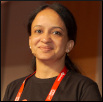
 About JCP
Get Involved
Community Resources
Community News
FAQ
Contact Us
About JCP
Get Involved
Community Resources
Community News
FAQ
Contact Us

|
 |
Java Community Process: Executive Committee Elections Nominees for 2024

|
The 2024 Fall Executive Committee (EC) elections process is now complete. The EC elections process was launched in June 2000.
This election was hosted by Votenet and closed on 18 November 2024 at 11:59 PM Pacific Standard Time.
This year, there were 6 Ratified, 2 Elected, and 1 Associate Seats open for election.
The election results are now available.
Congratulations to the newly elected and re-elected EC Members and thank you to all the nominees for participating in this year's election.
We hosted a
Meet the JCP EC Candidates Zoom webinar on October 24 at 10 AM PDT.
The recording is now available on our multimedia page.
Please refer to the Java Community Process EC Elections page for more information on the Executive Committee Elections.
Please refer to the Executive Committee Information page for more information on the current Executive Committee.
What follows are the qualification statements provided by the candidates for the Executive Committee, along with a
brief biography of the person who would serve as the Member's representative on the Executive Committee if elected,
and a position statement when one is provided.
| 2024 EXECUTIVE COMMITTEE RATIFIED SEAT CANDIDATES |
Alibaba
|
As one of the world's largest users of Java, Alibaba is deeply committed to Java's success. We utilize Java across
diverse business scenarios, with tens of thousands of developers contributing over a billion lines of Java code.
Our involvement in the OpenJDK and active contribution to the OpenJDK update and tip projects are a testament to
this commitment. Since the last JCP EC election, we introduced 7 more authors along with 2 more committers to the
OpenJDK community. Alibaba's contributions to OpenJDK position us among the notable external contributors. To
support RISC-V, we first kicked off the RISC-V support in OpenJDK 11u and completed the main porting work.
Further, we enhanced the Loom project's functionality on RISC-V. As a member of the GraalVM Project Advisory Board,
Alibaba is actively engaged in the project. In the GraalVM tip project, we have implemented an innovative approach to
support Java agent so that native image runtime observability becomes possible in production use. Alibaba's involvement
in the Java community extends beyond the Java Runtime. We actively participate on the corporate level in a wide range
of open-source projects in the Apache and Eclipse communities. We are the most significant contributor to Apache Flink,
Dubbo, RocketMQ, etc. As a founding strategic member of the Eclipse Adoptium Working Group, Alibaba actively contributes
to Eclipse Migration Toolkit for Java(EMT4J) and AQAvit sub-projects under Adoptium, co-working with community members
to strive to ensure developers have access to a vendor-neutral, high-quality, reliable Java platform. As a member of the
JCP EC, we look forward to a stronger relationship with the Java community, contributing more to JCP, and collaborating
with the industry for the common good of the Java ecosystem.
Alibaba Position Statement (.pdf file)
|

Sanhong Li
|
Sanhong Li has been working on Java since 2004, when he began at Intel, implementing JSR135. He progressed to working
on developing IBM's J9VM in 2010, where he led a project to develop multi-tenancy technology for the JVM. In 2014,
he joined Alibaba to lead the development of Alibaba Dragonwell, a downstream of OpenJDK. He has authored over twenty
technical patents/papers in the areas of managed runtime and presented at various conferences such as JVMLS, JavaOne,
QCon, etc. He is a Java Champion and the co-leader of the GreenTea JUG (the largest JUG in China), Alibaba's representative
of the GraalVM Project Advisory Board, and Eclipse Adoptium PMC member.
|
| | |
BellSoft
|
BellSoft's mission is to make Java technology the #1 choice for modern enterprises. To achieve this compound goal,
BellSoft delivers the most complete Java experience with a more secure, reliable, and cost-effective approach to
application development on any platform and in any environment.
BellSoft releases and supports a free and secure OpenJDK binary distribution compliant with Java SE Standard —
Liberica JDK. Liberica JDK is available for all major versions of the Java SE specification, most platforms
(Windows, Linux, macOS, Solaris), and the largest number of present-day architectures (x86 64/32 bit, ARM,
PowerPC, SPARC), including microservices-based ones. Therefore, BellSoft‘s Liberica JDK presents a Unified
Java Runtime: one runtime for cloud, server, and desktop use cases.
BellSoft's team believes that Java can be flexible and adaptive in response to ongoing business changes.
We rely on continuous feedback from thousands of our clients to develop new solutions with the community,
while also preserving industry traditions and maintaining the highest quality standards. BellSoft greatly
appreciates the role of Java SE in the success of the technology, thus all Liberica JDK binaries are
TCK-verified in compliance with the Java SE specification.
We trust technology standards to guide further Java enhancements and keep its community vibrant. Easily accessible
technology standards for those working on Java's future help the Java ecosystem thrive. Besides OpenJDK, BellSoft
provides the minimized and optimized Linux distribution, Alpaquita Linux, created to address Java pain points.
BellSoft Position Statement (.pdf file)
|

Aleksei Voitylov
|
With 15 years of Java experience, Aleksei Voitylov, PhD, is the CTO and co-founder of BellSoft, a company that
releases and supports an OpenJDK binary distribution for a variety of platforms called Liberica JDK. Throughout
his career at Sun and Oracle, Aleksei worked with various JVMs and JSR implementations (Java ME, Java SE, and Java EE)
and, in particular, helped deliver multiple components of the JDK 8 and 9 releases, including HotSpot JVM and
the Java Language.
He founded BellSoft with the ambition of providing a free, high-quality, and supported Java SE Runtime that
would remain relevant for all use cases, from embedded to cloud and enterprise. Aleksei is an Open Source
Evangelist, actively involved with Java open source communities and projects. He is also an OpenJDK contributor
who takes part in various Java developer conferences, ranging from Oracle Code One to local JUGs, and contributes
articles to the Java Magazine.
|
| | |
BNY
|
BNY Technology, with over $3.5 billion budget in 2024, has more than 12,000 technologists globally, supporting
the bank's role as a leading provider of global financial services. We innovate solutions that support BNY’s role
as one of the largest investments companies in the world, managing $49.5 trillion in assets under custody as of
July 30, 2024. The Java ecosystem is a significant part of the technology stack across the firm. BNY is represented
by Java Champions and Java User Group Leaders at the JCP Executive Committee: Sirisha Pratha, Rodrigo Graciano and
Victor Grazi. BNY proudly includes Java Champion Loiane Groner in their team.
Java Community Involvement:
- Actively involved in the EC as a current ratified member
- Hosted JCP EC 2023 Face-to-Face event at BNY Headquarters in NY 30+ attendees
- Participating in OpenJDK Quality Outreach Program via Spring and Code Katas
- Committed to Java in Education via work groups
- Leading Java User Groups in New York City, New Jersey, and Pittsburgh
- Engaging with the community via presentations, blogs, workshops for all levels of developers
- Maintaining Open-Source Code Katas to help teach language and library features to keep pace with the six-month Java release train
- Project creator of Java Concurrent Animated - an Open-Source library for helping tens of thousands learn Java Concurrency
- Actively contributing to Eclipse Collections Open-Source library
- Book authorship to learn about Java ecosystem, "Real World Java" by Victor Grazi
- Rodrigo Graciano elected as a Java Champion from BNY in November 2022
As a member of the Java Community Process EC, our representatives will focus on education, evolution,
stability, and adoption of Java, both in and outside BNY.
BNY Position Statement (.pdf file)
|

Sirisha Pratha
|
Sirisha Pratha is a Senior Vice President in Application Development at BNY. Sirisha has more than 14 years
of experience as a Java Software Developer. Sirisha is a InfoQ Editor, committer on Eclipse Collections,
an Open Source Java Collections Library. Sirisha co-leads Pittsburgh Java User Group and regularly speaks
and attends at various other Java User Group meetups.
|
| | |
JetBrains
|
Creator of IntelliJ IDEA, one of the most popular Java IDEs, JetBrains makes development a more productive and
enjoyable experience for developers across the globe. JetBrains sets a high bar for itself in supporting new
Java features in IntelliJ IDEA (including preview features), increasing their adoption by the developer community.
As a member of the Executive Committee, JetBrains brings multiple areas of expertise. We are:
- developers that use Java extensively to develop our wide suite of tools.
- the creators of JVM language Kotlin, and understand the benefits of the JVM as a platform and know its impact
is wider than just Java-the-language.
- leaders who understand the challenges of implementing new standards since we create tools for developers.
- active advocates for the Java platform, and help developers to learn about and adopt new APIs and standards.
JetBrains believes involvement in the community is fundamental to helping the Java platform to evolve and before
being on the JCP EC, JetBrains was involved in several Expert Groups, including JSR 305 (Annotations for Software
Defect Detection), JSR 334 (Project Coin) and JSR 335 (Lambda Expressions).
|

Mala Gupta
|
Mala Gupta works as a Developer Advocate with JetBrains. A Java Champion, she has authored multiple books with
Manning, Packt, and O'Reilly Publications on Java. She often presents at industry conferences on modern Java
features and has over two decades of experience in the industry. She has been actively supporting Oracle's Java
certification as a path to career advancement. She co-leads Delhi's Java User Group.
|
| | |
MicroDoc
|
MicroDoc, headquartered in Munich, Germany, has been a driving force in the Java ecosystem since 2000. As experts
in embedded Java Virtual Machines (VMs), we deliver solutions for key industries including automotive, energy,
and healthcare. Our long-standing commitment to open standards is evident through our active contributions to
both the OpenJDK and GraalVM projects, reinforcing our leadership in the field.
Since joining the Java Community Process Executive Committee (JCP EC) in 2014, MicroDoc has played a crucial role
in shaping Java’s future, particularly for embedded systems. We address challenges in performance, optimization,
and scalability, ensuring Java's continued relevance across diverse hardware architectures while maintaining strict
adherence to Java standards.
Looking forward, MicroDoc is dedicated to advancing Artificial Intelligence (AI) within the Java ecosystem by
focusing on running AI algorithms locally on embedded devices. This approach enhances data security, privacy and
compliance with GDPR by processing data directly on the device, minimizing the need for data transmission. Our goal
is to integrate these AI capabilities into Java for intelligent, secure, and efficient embedded applications. Through
our active participation in the JCP, Expert Groups, and industry events, MicroDoc offers a forward-thinking perspective
that will drive Java’s evolution in the realm of smart and secure technologies.
MicroDoc Position Statement (.pdf file)
|

Bruno Caballero
|
Bruno Caballero is a software engineer at MicroDoc, based in Berlin, Germany. With extensive experience in embedded software
development, Bruno has worked on a diverse array of projects throughout his career. Over the past year, he has been focused
on integrating artificial intelligence algorithms into embedded devices, alongside his ongoing work porting the Java virtual
machine to new hardware platforms and operating systems. Bruno also assists clients in developing Java solutions for
embedded devices and is particularly interested in exploring new methodologies to enhance the speed and security of Java
applications.
|
| | |
SAP SE
|
With over 250,000 enterprise customers, SAP is the world's leading provider of business software. A significant portion of
those SAP customers run SAP software based on Java. SAP is committed to the continued success of Java. It is part of SAPs
latest cloud offerings, tools as SAP Build Code want to empower even more people to develop business applications with Java,
always based on the latest technology as currently Java 21. We embrace the Tip&Toe scheme: most of our JVM usages have moved
away from Java 11 to 17 and 21. SAP has participated in the JCP since 2001, and collaborated in over 50 JSRs. SAP contributes
to OpenJDK since 2012. It is among the biggest external contributors to the OpenJDK project. It currently leads the OpenJDK 17
updates project and the AIX/ppc port project. Further SAP is heavily involved in the OpenJDK 11 and 21 updates projects aiming
to keep all SAP Supported OpenJDK LTS versions up to date. SAP is member of the vulnerability group preparing fixes for security
issues. It concentrates on improving stability and servicability, core properties needed for business applications. SAP offers
SapMachine, a free build of OpenJDK on a broad variety of platforms.
|

Götz Lindenmaier
|
Götz Lindenmaier works for SAP for more than 19 years. During this time he was involved in various projects around the SAP
Java Virtual Machine. With his background in compiler construction he started with porting Java 5 to the Itanium platform
integrating an instruction scheduler in C2. This is still live in SAP's Java 8 JVM. After working on the ppc and s390 port
he continued enhancing the SAP Java Virtual Machine with new features and maintaining it. Götz is OpenJDK reviewer for a long
time and helped SAP and its Java VM team engage in the OpenJDK project. He contributed the AIX, ppc and s390 ports on behalf
of SAP. The ppc port was the first platform port to make it to the mainline of OpenJDK breaking the ice for further large
contributions. Currently Götz is the lead of the OpenJDK 17 updates project and participating in the OpenJDK 11 and 21 updates
projects. In this role he monitors all changes contributed to these jdks to assure stability and quality while allowing the
necessary modernization to keep them relevant for modern systems.
|
| | |
| 2024 EXECUTIVE COMMITTEE ELECTED SEAT CANDIDATES |
Eclipse Foundation
|
Eclipse Foundation has been participating as a champion of open source on the JCP Executive Committee since 2007.
As the home of the Eclipse Java IDE, Jakarta EE (formerly Java EE), MicroProfile, Adoptium, and the Eclipse Temurin
Java SE runtime, the Eclipse Java Compiler, Eclipse Collections, and OpenJ9 we are very much committed to an
open Java ecosystem.
Our primary contribution to the JCP EC has always been to represent the interests of the open source community,
and for independent implementations of Java specifications. We also have a specification process that has been
used successfully for Jakarta EE, MicroProfile, Eclipse Sparkplug, and AsciiDoc.
We would like to continue representing our communities and others with similar interests on the JCP EC
and would appreciate your support.
Eclipse Foundation Position Statement (.pdf file)
|

Ivar Grimstad
|
Ivar Grimstad is the Jakarta EE Developer Advocate at Eclipse Foundation. He has served on the EC since 2016, worked on
several JSRs and has been awarded as Outstanding Spec Lead and Star Spec Lead. At Eclipse Foundation, he works with
Jakarta EE as well as multiple other open source projects within the Java ecosystem.
|
| | |
Google
|
Google believes open source solves real-world problems for everyone. Google has supported open source innovation,
collaboration, and sustainability throughout the years. We have a strong track record of contributing to the open
source community with projects such as Chromium, Kubernetes, Cloud Native Computing Foundation as well as prior
participation in the JCP Executive Committee. We have been involved with Java and the JCP for over 20 years
through our work on enhancements, standards and specifications. We want to actively support the continued
success of Java as a member of the Executive Committee.
Java is one of the most used programming languages at Google and it is extensively deployed across our business
where we are among the world leaders in the scale of deployments. Googlers continue to contribute back to the
Java community in a dedicated effort toward improving Java, and our team members have long been involved as
contributors, leads and reviewers across numerous OpenJDK projects/groups.
As a member of the JCP EC, Google can work directly to ensure the interests of the broad group of Java users
and the open source community continue to be put first. We believe Java is important for the open source community
and that it has a key place in our industry across client, server and cloud environments. We would like to have
an active role in guiding new growth, specs and features that provide a better, faster, more secure, more
stable and more user-friendly environment for the developer community.
Google is enthusiastic about the future of Java with the improvements that have been made and the changes that
are yet to come. Election to the JCP Executive Committee will allow us to play a bigger part in this journey
and to help ensure this growth benefits all, from the smallest and simplest instance, to the largest and most
complex deployments.
Google Position Statement (.pdf file)
|

David Hensley
|
David Hensley works at Google where he currently runs the Java Platform team. David has worked with Java since its
beta release in 1995. He has led a vast array of Java based projects ranging from client side apps, embedded, java
malware protection, service / protocol adapters, interop for other languages and massively scalable server applications.
David’s leadership in Java development has included holding architect and leadership roles at SeeBeyond (acquired by Sun),
Yahoo, Symantec, Google and multiple startups. Additionally David has been personally involved with the JCP in the past,
working as an expert group member on both JSR 311 (JAX-RS) and JSR 312 (JBI).
|
| | |
Microsoft
|
Microsoft deploys over 2.5 million internal JVMs across its businesses and runs Java on behalf of our customers on Azure.
For example, the Microsoft Build of OpenJDK powers LinkedIn services and Mojang's Minecraft Java Edition for millions of
gamers worldwide. Microsoft has a dedicated Java Engineering Group to contribute directly to OpenJDK. Java also powers
critical infrastructure behind Microsoft Azure services, and Bing search.
Microsoft has been investing significantly in Open-Source tools, and services for Java developers. Over the past few
years, Visual Studio Code, with over 2 million active Java developers using it, has become the 3rd most used IDE / Code
Editor for Java development. Extensions developed by Microsoft and other vendors and independent developers leverage a
variety of projects from well-known OSS foundations. Java language support for Visual Studio Code relies on the Eclipse
JDT project, which Microsoft actively collaborates with Red Hat.
Our Java investments also expand through specific big data projects (Apache Lucene, Hadoop, Apache Spark, Apache Zookeeper,
Apache Kafka, et al.) that are critical to Microsoft's core businesses, including Bing’s search index and Azure
Big Data services.
Azure customers and Microsoft have cross-platform requirements, and Microsoft wants to continue promoting Java's WORA
promise. Azure now offers its own distribution of Linux, and along Windows and ports of many of its software for Mac OS
included, Microsoft helps secure a future of cross-platform development. Windows remains the most used operating system
by Java developers. Microsoft continues to invest and improve Windows to ensure that the developer experience remains
productive, fast, secure, and delightful.
Microsoft Position Statement (.pdf file)
|

Bruno Borges
|
Bruno Borges is Principal PM Manager at Microsoft for Java related products and services. Bruno has 24 years of experience
and is a distinguished figure in the fields of Product Management, Cloud Developer Experience & Tools, and Developer Relations.
Residing in Vancouver, Canada, Bruno specializes in Java runtimes development and enhancing developer relations for Microsoft,
aiming to create the best cloud environment for Java workloads and developers. Notably, he led the public announcement of the
Microsoft Build of OpenJDK, Microsoft's own open-source distribution of Java.
Recently, Bruno and the Java Engineering Group at Microsoft also published the Semantic Kernel for Java, a framework for
building intelligent Java applications that can leverage Large Language Models with ease.
Prior to Microsoft, Bruno worked for nearly six years at Oracle, influencing developer relations strategy and governance.
Recognized as a Top Java Influencer and a Java Champion, Bruno's contributions have significantly impacted the Java community.
|
| | |
| 2024 EXECUTIVE COMMITTEE ASSOCIATE SEAT CANDIDATES |
Enis Brulic
|
no presentation of an organization; CEO of arrowhacks.com
|

Enis Brulic
|
Full-Stack software developer
- Java / JEE since JDK-1.1 and J2EE
- React / React Native for the last 6 years In-depth knowledge of
- Java / Cloud Native development with Quarkus and JakartaEE
- Reactive Programming with Quarkus (Mutiny)
- Red Hat OpenShift, Google Cloud Platform and Kubernetes
- and other relevant technologies.
|
| | |
Deep Netts Technologies
|
Zoran Sevarac is a Java Champion and he served as the co-lead of the expert group for
JSR 381, the Visual Recognition API using machine learning. In recognition of his work on this JSR,
alongside Frank Greco, he received the awards for Most Significant JSR (2018) and JCP Member of the
Year (2023). As CEO of Deep Netts, he focuses on enabling native AI support in Java. The community
edition of the Deep Netts Java library serves as the reference implementation for the Visual Recognition
API JSR 381. With his background, Zoran brings valuable expertise in AI and machine learning to the
Executive Committee (EC). His primary goals within the EC are to accelerate the development of Java
platform features that support AI, leveraging existing tools and projects, and to make it exceptionally
easy to integrate AI into Java applications.
|

Zoran Sevarac
|
Zoran Sevarac is the co-founder and CEO of Deep Netts Technologies, a startup focused on developing a
Java-based AI development platform, and a full professor at University of Belgrade. The goal of this
project is to simplify the process of integrating AI into Java applications and support the AI-driven
evolution of the Java platform. His primary areas of interest include artificial intelligence, machine
learning, software engineering, and Java. Zoran is a contributor to Apache NetBeans and several Java-related
machine learning initiatives. He is also a recognized Java Champion and recipient of the Duke's Choice Award
for his educational neural network software, Neuroph. In addition to his work in AI, he plays guitar and is a
member of the Null Pointers, a Java community band.
|
| | |
Christian Grobmeier
|
Grobmeier Solutions GmbH is a company focused on Java technologies and open-source solutions. It is
led by CEO Christian Grobmeier, a certified Data Privacy Officer (TÜV Nord).
Grobmeier Solutions has a strong relationship with the Apache Software Foundation, where it contributes
significantly to various projects, including Apache Logging Services (notably Log4j), and supports initiatives
within the Apache Incubator and Commons. The company also emphasizes the importance of open-source communities
and transparency, with its founder serving as an independent board member of the PRAGMA open-source foundation.
Through these contributions, Grobmeier Solutions GmbH aims to advance the adoption and development of
open-source technologies in the Java ecosystem.
|

Christian Grobmeier
|
Christian Grobmeier is the CEO, certified Data Privacy Officer (TÜV Nord), and sole employee at Grobmeier Solutions GmbH.
He has extensive experience with Java technologies and a long-standing commitment to the open-source community.
Christian serves as the Vice President of Data Privacy at the Apache Software Foundation and is a Project Management
Committee (PMC) member for Apache Logging Services. He is also an active speaker at Java User Groups. He provides
training on Java technologies such as OCA preparation and frameworks like Spring and Hibernate.
Christian is a published author. He is currently writing a book on Java Logging for beginners, which Manning will
publish. His previous works include publications on the now-deprecated Apache Forrest technology and The Zen Programmer.
He shares his insights on Java and open source on his blog at
https://grobmeier.solutions and on Mastodon at
https://mastodon.social/@grobmeier.
|
| | |
A N M Bazlur Rahman
|
Rahman Position Statement (.pdf file)
|

A N M Bazlur Rahman
|
A N M Bazlur Rahman is a Software Engineer with over a decade of specialized experience in Java and related technologies.
His expertise has been formally recognized through the prestigious title of Java Champion. Beyond his professional commitments,
Mr. Rahman is deeply involved in community outreach and education. He is the founder and current moderator of the Java User
Group in Bangladesh, where he has organized educational meetups and conferences since 2013.
Mr. Rahman has been an active speaker at various international conferences and Java user groups in the past few years.
His talks have often focused on specialized topics such as concurrency and virtual threads. In addition to his community
work, Mr. Rahman also serves as an editor for Java Queue at InfoQ and Foojay.io. Notably, he has authored five books on
the Java programming language in Bengali, three of which have become best sellers in Bangladesh.
He is currently writing a new book with O'Reilly titled "Modern Concurrency in Java."
https://learning.oreilly.com/library/view/modern-concurrency-in/9781098165406/
|
| | |
Miroslav Wengner
|
Although Miro is primarily focused on the Java language, he also actively helps engineers develop JVM-based
distributed projects in other platform languages ??such as Scala or Kotlin. He shares experiences with the
community through feedback not only JVM-based projects. Miro participates in many discussions across the
Java environment that contribute to the future of the ecosystem. Assists and supports JUGs communities through
presentations or engagement.
|

Miroslav Wengner
|
Miro is a long-term member of the JCP program and contributes to OpenJDK, Mission Control project. Miro focuses on
Java performance and maintainability. Contributed/contributed to various other open-source projects such as OpenTracing,
Pi4J, etc. Miro is the co-author of the Robo4j project, which won the DukeChoice award in 2017. He has been recognized
as a Java Champion, OracleACE Pro and JavaOne RockStar speaker. Shares knowledge at conferences (JavaLand, JCON, JavaOne,
CodeOne, Devoxx, GeeCON, etc.) and blogs. Miro recently wrote the book Practical Design Patterns for Java Developers,
published by Packt. He believes the book contributes to smooth and efficient use of the new enhancements that are fully
available in Java SE 21.
|
| | |
ABOUT THE JAVA COMMUNITY PROCESS (JCP) EXECUTIVE COMMITTEE
Under the JCP 2.11 rules, the EC has resized. In 2021 and going forward, there will be 11 Ratified Seats, 4 Elected Seats, 2 Associate
Seats and the permanent seat held by Oracle America. Members serve 2-year terms that are staggered so that 8 or 9 of the 17 seats are
normally up for ratification/election each year. For more information about the Executive Committee elections, read the JCP EC Elections page. In the event of a tie in the elections, the PMO will follow the current tiebreaker process.
The EC members guide the evolution of the Java technologies. The EC
represents a cross-section of both major stakeholders and other members
of the Java Community. Duties are: select JSRs for development, approve
draft Specifications for Public Review, approve Final Specifications,
review TCK appeals, approve Maintenance revisions and possibly defer
some features to a new JSR, approve transfer of maintenance duties
between members and provide guidance to the Program Management Office
(PMO). For more information on the EC, see the Executive Committee Info
page http://jcp.org/en/participation/committee.
2023 EC Elections Results
2022 EC Elections Results
2021 EC Elections Results
2020 EC Elections Results
2019 EC Elections Results
2018 EC Elections Results
2018 EC Special Elections Results
2017 EC Elections Results
2017 EC Special Elections Results
2016 EC Elections Results
2015 EC Elections Results
2014 EC Elections Results
2013 EC Elections Results
2012 EC Elections Results
2011 EC Elections Results
2010 EC Elections Results
2009 EC Elections Results
2008 EC Elections Results
2007 EC Elections Results
2006 EC Elections Results
2005 EC Elections Results
2004 EC Elections Results
2003 EC Elections Results
2002 EC Elections Results
2001 EC Elections Results
2000 EC Elections Results
For more information on the JCP, see the JCP Overview page.
Contact the PMO for election questions at pmo@jcp.org.
|
 |
|